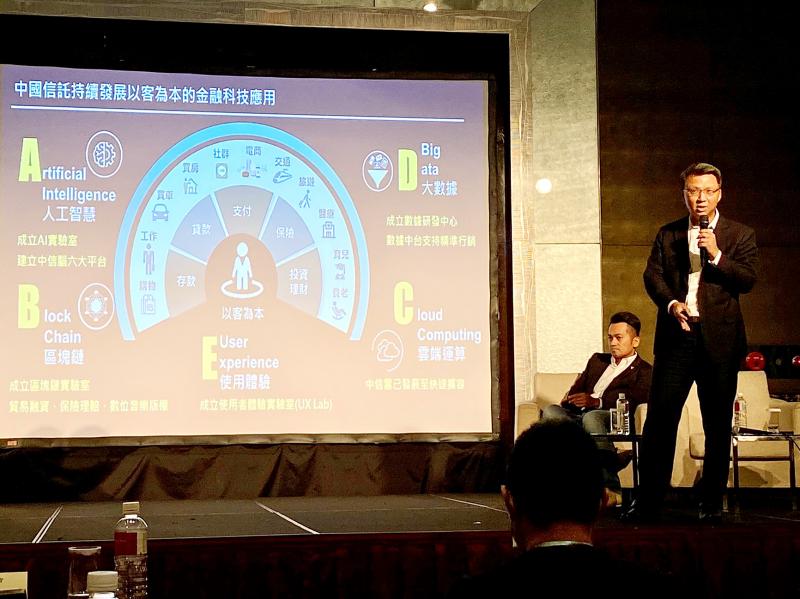Cathay United Bank (國泰世華銀行) plans to use artificial intelligence and big data analysis to learn what customers need and maintain their loyalty, as emerging virtual banks are likely to poach existing establishments’ clients with fancy marketing and rewards, Cathay United Bank president Alan Lee (李偉正) said.
“No bank dares to say that they are not worried about competition from new virtual banks, and neither can we, but our advantage is that we have long relationships with our clients, know them better and can provide financial products to suit their exact preferences,” Lee said on Wednesday last week.
For example, the bank has used big data analysis to choose people who have a high demand for funds and might be interested in applying for personal loans, Lee said, adding that Cathay United then sends marketing information to those potential clients.

Photo: Kao Shih-ching, Taipei Times
Among the 5 million clients who use Cathay United Bank’s credit cards, about 60 percent have applied for its other financial products, such as mortgages, wealth management products or small loans, Lee said.
The bank aims to raise that ratio, he added.
“The more products the clients have or the more frequently they interact with us, the more difficult it is for them to leave us and the more loyal they are likely to become,” Lee said.
Cathay United Bank does not invest in any of the nation’s three virtual banks. The lender had 680,330 digital savings accounts as of the end of June, the second-highest after Taishin International Bank’s (台新銀行) Richart service, Financial Supervisory Commission data showed.
CTBC Bank (中國信託銀行), which holds a 5 percent stake in Web-only Line Bank (連線商業銀行), would not share its financial technology with the virtual bank, as it does not have a controlling stake in the lender, CTBC Financial Holding Co chief technology officer Titan Chia (賈景光) said.
CTBC Bank is also using artificial intelligence, blockchain technology, cloud computing, big data and user experiences to improve its online banking services, Chia said.
The bank might allow Line Bank’s clients to withdraw cash or conduct other transactions at its automated teller machines, with Line Bank paying the handling fees, he added.

China’s Huawei Technologies Co (華為) plans to start mass-producing its most advanced artificial intelligence (AI) chip in the first quarter of next year, even as it struggles to make enough chips due to US restrictions, two people familiar with the matter said. The telecoms conglomerate has sent samples of the Ascend 910C — its newest chip, meant to rival those made by US chipmaker Nvidia Corp — to some technology firms and started taking orders, the sources told Reuters. The 910C is being made by top Chinese contract chipmaker Semiconductor Manufacturing International Corp (SMIC, 中芯) on its N+2 process, but a lack

NVIDIA PLATFORM: Hon Hai’s Mexican facility is to begin production early next year and a Taiwan site is to enter production next month, Nvidia wrote on its blog Hon Hai Precision Industry Co (鴻海精密), the world’s biggest electronics manufacturer, yesterday said it is expanding production capacity of artificial intelligence (AI) servers based on Nvidia Corp’s Blackwell chips in Taiwan, the US and Mexico to cope with rising demand. Hon Hai’s new AI-enabled factories are to use Nvidia’s Omnivores platform to create 3D digital twins to plan and simulate automated production lines at a factory in Hsinchu, the company said in a statement. Nvidia’s Omnivores platform is for developing industrial AI simulation applications and helps bring facilities online faster. Hon Hai’s Mexican facility is to begin production early next year and the

Who would not want a social media audience that grows without new content? During the three years she paused production of her short do-it-yourself (DIY) farmer’s lifestyle videos, Chinese vlogger Li Ziqi (李子柒), 34, has seen her YouTube subscribers increase to 20.2 million from about 14 million. While YouTube is banned in China, her fan base there — although not the size of YouTube’s MrBeast, who has 330 million subscribers — is close to 100 million across the country’s social media platforms Douyin (抖音), Sina Weibo (新浪微博) and Xiaohongshu (小紅書). When Li finally released new videos last week — ending what has

AVIATION BOOM: CAL is to renew its passenger and cargo fleets starting next year on record profits as aviation continues to return to pre-pandemic levels China Airlines Ltd (CAL, 中華航空) yesterday said it is optimistic about next year’s business outlook, as the airline continues to renew its fleet on expectations that global passenger traffic would maintain steady growth and air cargo demand would remain strong. From next year to 2028, the airline is to welcome a new Boeing Co 787 fleet — 18 787-9 and six 787-10 passenger aircraft — to cover regional and medium to long-haul destinations, CAL chairman Hsieh Shih-chien (謝世謙) said at an investors’ conference in Taipei. The airline would also continue to introduce Airbus SE 321neo passenger planes and Boeing 777F cargo jets,